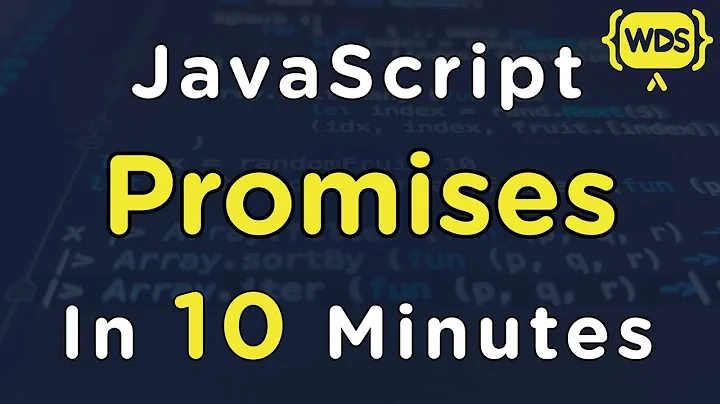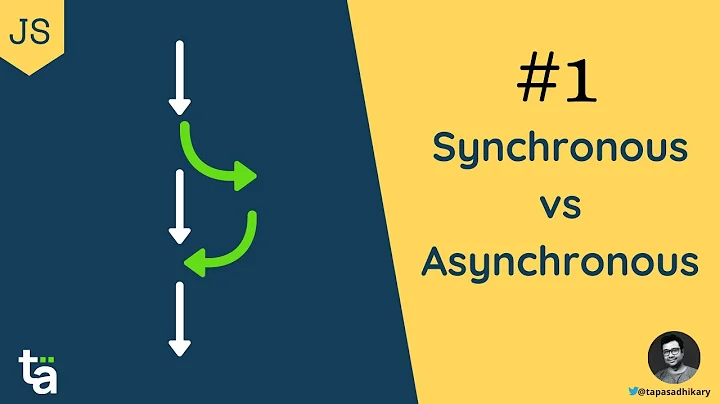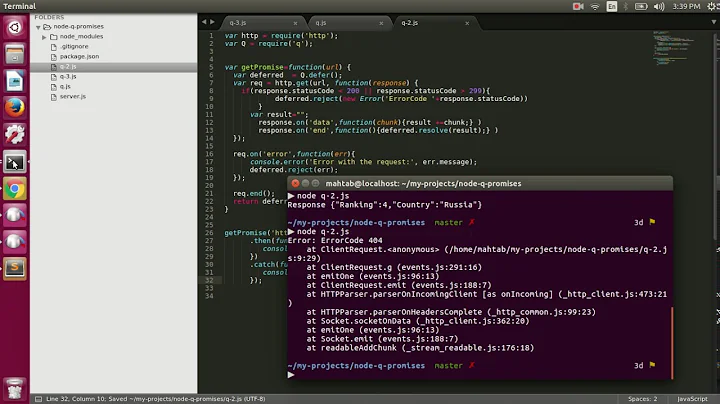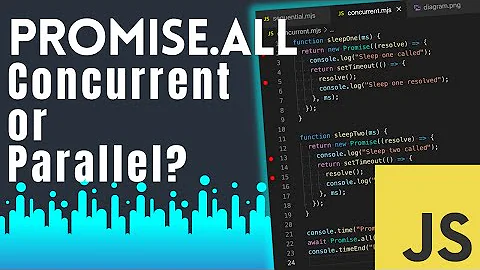how to use q.js promises to work with multiple asynchronous operations
Solution 1
My suggestions to get this working with Q.js are below. The key is that anytime you want to do something asynchronously, you should return a promise, and once the task is completed you should resolve that promise. That allows the callers of the function to listen for the task to be completed and then do something else.
As before, I have commented my changes with // ***. Let me know if you have any further questions.
function traverseFiles() {
// *** Create an array to hold our promises
var promises = [ ];
for (var i=0, l=pages.length; i<l; i++) {
// *** Store the promise returned by getSizeSettingsFromPage in a variable
promise = getSizeSettingsFromPage(pages[i]);
promise.then(function(values) {
var width = values[0],
height = values[1],
filename = values[2];
// *** When the promise is resolved, call calculateRatio
calculateRatio(width, height, filename);
});
// *** Add the promise returned by getSizeSettingsFromPage to the array
promises.push(promise);
}
// *** Call checkWhenReady after all promises have been resolved
Q.all(promises).then(checkWhenReady);
}
function getSizeSettingsFromPage(file) {
// *** Create a Deferred
var deferred = Q.defer();
reader = new FileReader();
reader.onload = function(evt) {
var image = new Image();
image.onload = function(evt) {
var width = this.width;
var height = this.height;
var filename = file.name;
// *** Resolve the Deferred
deferred.resolve([ width, height, filename ]);
};
image.src = evt.target.result;
};
reader.readAsDataURL(file);
// *** Return a Promise
return deferred.promise;
}
Edit
defer creates a Deferred, which contains two parts, a promise and the resolve function. The promise is returned by getSizeSettingsFromPage. Basically returning a promise is a way for a function to say "I'll get back to you later." Once the function has completed it's task (in this case once the image.onload event has fired) the resolve function is used to resolve the promise. That indicates to anything waiting on the promise that the task has been completed.
Here's a simpler example:
function addAsync(a, b) {
var deferred = Q.defer();
// Wait 2 seconds and then add a + b
setTimeout(function() {
deferred.resolve(a + b);
}, 2000);
return deferred.promise;
}
addAsync(3, 4).then(function(result) {
console.log(result);
});
// logs 7 after 2 seconds
The addAsync function adds two numbers but it waits 2 seconds before adding them. Since it's asynchronous, it returns a promise (deferred.promse) and resolves the promise after the 2 second wait (deferred.resolve). The then method can be called on a promise and passed a callback function to be executed after the promise has been resolved. The callback function is passed in the resolution value of the promise.
In your case, we had an array of promises and we needed to wait for all of them to be done before executing a function, so we used Q.all. Here's an example:
function addAsync(a, b) {
var deferred = Q.defer();
// Wait 2 seconds and then add a + b
setTimeout(function() {
deferred.resolve(a + b);
}, 2000);
return deferred.promise;
}
Q.all([
addAsync(1, 1),
addAsync(2, 2),
addAsync(3, 3)
]).spread(function(result1, result2, result3) {
console.log(result1, result2, result3);
});
// logs "2 4 6" after approximately 2 seconds
Solution 2
Looks like you should use the Q.all function to create a master promise corresponding to when all the getSizeSettings promises are fufilled.
https://github.com/kriskowal/q#combination
var ps = [];
for (var i=0, l=pages.length; i<l; i++) {
ps[i] = getSizeSettingsFromPage(pages[i], calculateRatio);
}
Q.all(ps).then(function(){ callWhenReady() })
Most promise libraries should provide a similar method to do this kind of synchronization. If you ever come across one that does not what you could do is hook each individual promise to a callback that increments a shared counter when its called. When your counter reaches n you know that you already resolved all promises so you can have the incrementor callback call the "real" callback as well.
//If you did not have Q.all available
//Or had to code this without a promise library
var to_go = pages.length;
for (var i=0, l=pages.length; i<l; i++) {
getSizeSettingsFromPage(pages[i], calculateRatio)
.then(function(){
to_go--;
if(to_go == 0){
callWhenReady()
}
});
}
Note that in these cases until now the async calls are allowed to run parallel. If you need them to run sequentially then usually the only way is to rewrite the for loop as a recursive function
var go = function(i){
if(i>=pages.length){
return call_next_step()
}else{
return do_ith_calculation(i)
.then(function(){
return go(i+1)
})
}
};
go(0);
Related videos on Youtube
Kim Stacks
I build end-to-end workflow solutions to process data such as BOQ (Bill of Quantities) for businesses in telecomms, civil engineering, and construction.
Updated on March 11, 2020Comments
-
Kim Stacks about 4 years
Note: This question is also cross-posted in Q.js mailing list over here.
i had a situation with multiple asynchronous operations and the answer I accepted pointed out that using Promises using a library such as q.js would be more beneficial.
I am convinced to refactor my code to use Promises but because the code is pretty long, i have trimmed the irrelevant portions and exported the crucial parts into a separate repo.
The repo is here and the most important file is this.
The requirement is that I want pageSizes to be non-empty after traversing all the dragged'n dropped files.
The problem is that the FileAPI operations inside getSizeSettingsFromPage function causes getSizeSettingsFromPage to be async.
So I cannot place checkWhenReady(); like this.
function traverseFiles() { for (var i=0, l=pages.length; i<l; i++) { getSizeSettingsFromPage(pages[i], calculateRatio); } checkWhenReady(); // this always returns 0. }This works, but it is not ideal. I prefer to call checkWhenReady just ONCE after all the
pageshave undergone this function calculateRatio successfully.function calculateRatio(width, height, filename) { // .... code pageSizes.add(filename, object); checkWhenReady(); // this works but it is not ideal. I prefer to call this method AFTER all the `pages` have undergone calculateRatio // ..... more code... }How do I refactor the code to make use of Promises in Q.js?
-
Kim Stacks over 11 yearsI tried github.com/simkimsia/learn-promises-javascript/commit/… which used your 2nd solution. The moment I drag and drop the files, the code broke. I cannot find anything wrong by looking at console.
-
Kim Stacks over 11 yearsi also tried the Q.all github.com/simkimsia/learn-promises-javascript/commit/… the code can run successfully, but the result returned was still 0.
-
Kim Stacks over 11 yearsi did not try the recursive function, because i do not have an intuitive understanding of it.
-
Kim Stacks over 11 yearsYour code works, Nathan. Because I want to learn, i want to ask, why is it that you use defer in getSizeSettngsFromPage? The answer provided by missingno did NOT use that. But of course, I couldn't get his code to work.
-
Nathan Wall over 11 yearsI have edited my answer to try to explain the reason for
defer, as well as some other things. Cheers :) -
Kim Stacks over 11 yearsExcellent answer, Nathan! You're the boss!
-
Kim Stacks over 11 yearsthanks for answer, missingno. I figured it out with Nathan's answer! Cheers :)
-
Nathan Wall over 11 yearsThanks kimisia. I just updated the original code to use the promise returned by
getSizeSettingsFromPageto callcalculateRatiowithout the need to pass in thewhenReadyparameter. As long as you're using promises, you might as well go all the way :-). Promises eliminate the need for those kinds of callbacks. -
Kim Stacks over 11 yearsJust to add that I went back to my original code and refactored it to include Q.js Promises code. And it worked well. Thank you.
-
Kim Stacks over 11 yearsOh thank you, Nathan! Seriously, I do not have an intuitive understanding of callbacks, so Promises with the keywords "then" really made it easier for me to read the code.
-
Rohan Desai over 11 years@kimsia: the recursive loop thing is only if you want to chain the async stuff one after the other. The second solution is how Q.all gets implemented under the hood - you only need it if you don't have Q.all available and need to code something lik eit yourself.
-
Kim Stacks over 11 yearsHi Nathan, I am currently facing a css/javascript issue at stackoverflow.com/q/13910422/80353 Was wondering if you can offer some advice.
-
Will almost 11 yearsBaller. An explanation like this should be in
Q's readme. Right now it seems to assume too much familiarity with the idea of promises. Maybe you could edit it and submit a pull request?:D -
 clevertension about 10 yearsQ.all([ addAsync(1, 1), addAsync(2, 2), addAsync(3, 3) ]).spread(function(result1, result2, result3) { console.log(result1, result2, result3); });
clevertension about 10 yearsQ.all([ addAsync(1, 1), addAsync(2, 2), addAsync(3, 3) ]).spread(function(result1, result2, result3) { console.log(result1, result2, result3); }); -
CMCDragonkai about 10 yearsWhat about the failure function? Do you get all the failed promises, or the most recent one?











